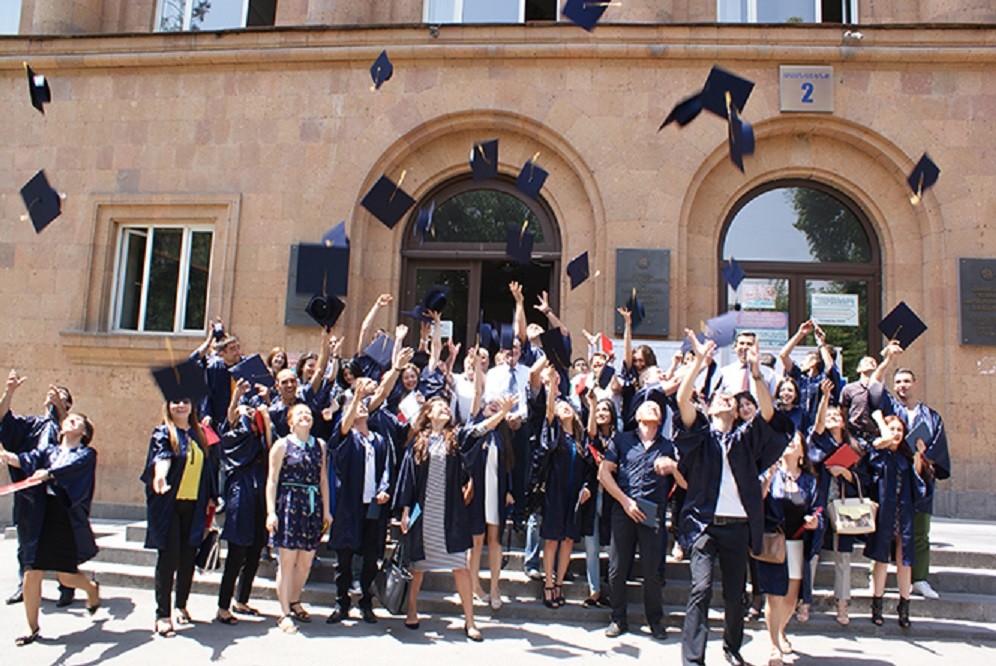
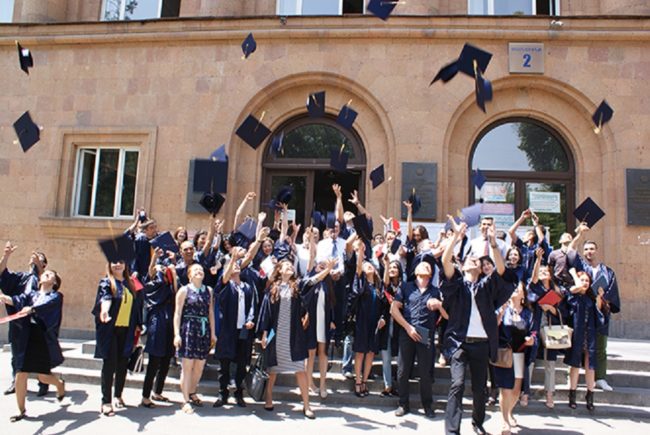
 With declining funding from the government, Armenia’s higher education system is facing crisis. On top of this, politicisation, outward migration, high fees for such a poor country, and a lack of clear strategy for the sector have left many experts worried.
With declining funding from the government, Armenia’s higher education system is facing crisis. On top of this, politicisation, outward migration, high fees for such a poor country, and a lack of clear strategy for the sector have left many experts worried.
[Read in Armenian — Հոդվածը հայերեն կարդացեք]
A politicised system
According to Vagram Soghomonyan from the Society of Civic Education, a grassroots advocacy group, Armenian universities do not develop critical thinking among students.
‘Social science subjects are especially one-sided. A critical approach is almost unrepresented. However, the main problem is the lack of academic freedom, the use of the university as an instrument of subordination and propaganda’, he said.
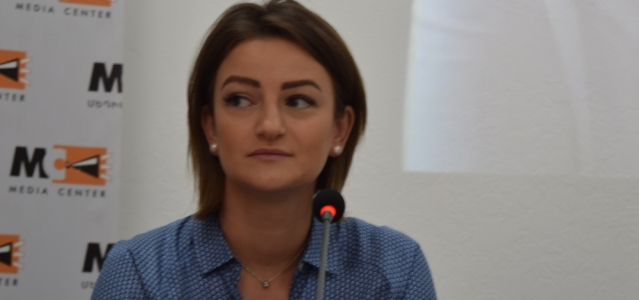
Arevik Anapiosyan, director of the Institute of Public Policy, a think-tank, emphasises that the country does not have a strategy for developing education. She also spoke of politicisation in higher education institutions in the country.
‘Today, the presidents of all major universities are high-ranking officials. The President of the Council of Yerevan State University is the President of the Republic. Because of politicisation, there is no free discussion in universities today, there is no discussion about issues’, she says.
Supply and demand
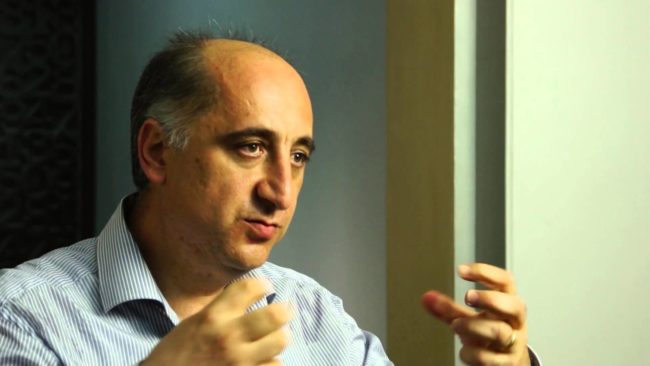
According to Serob Khachatryan, a lecturer at Yerevan State University and education expert, the problem is tightly linked with migration. He notes that 18,000 students have left Armenia in recent years. Many are graduates of schools with international curricula who are able to enter more prestigious universities abroad.
French specialist and author of the French–Armenian legal dictionary Izabella Abgaryan says the reason for the decrease in interest in obtaining higher education in Armenia is the absence of preparation for the job market.
‘Saying that taxi drivers in the country have two university degrees has become an aphorism, which means that even if a person has two degrees, they still work in the service sector because they cannot find a job in their major’, Abgaryan said.
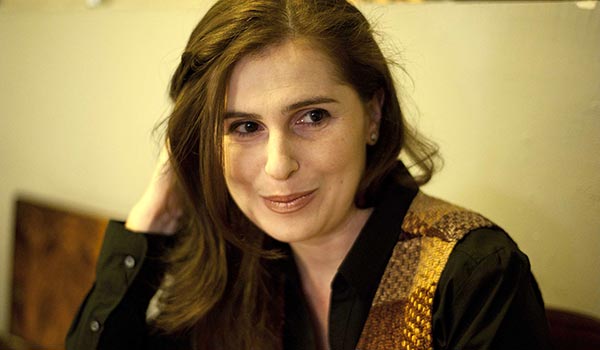
Arevik Anapiosyan notes that there is an imbalance between different faculties in the Yerevan State University. For example, there are no places for enrolment at the department of law and the department of international relations, while there are many places in other departments.
‘Universities today have to solve the issue of self-financing, and that’s why they add paid places, hoping they can provide for other departments from tuition paid to study in these departments. Look, there are no free spots in the department of international relations, and they sustain the department of physics at their expense’, Anapiosyan said.
Unaffordable fees
Another problem is the high price of education — in 2013, eleven higher education institutions in the country increased their fees by more than 50%. The lowest fees are for the Armenian State Pedagogical University, which charges ֏260,000 ($480) per year at the Faculty of Biology, Chemistry, and Geography. The highest fees are to study in the Therapeutic Faculty of Yerevan Medical University, which costs ֏1 million ($2,000) per year.
These fees are unaffordable for many in the country. According to the National Statistical Service of Armenia, the minimum wage is ֏55,000 ($110) per month, while the minimum consumer basket for the first quarter of 2017 was ֏57,000 ($120).
Aram Petrosyan, 22, a student of the Yerevan Polytechnic University, notes that after leaving the army he abandoned his studies. Instead of paying for an education that would not help him find a job, he decided to work.
‘Now I work in a restaurant in the centre of Yerevan as a waiter and earn quite well, ֏250,000 ($300), which I am very pleased with’, he says.
A student of Yerevan State University Narine Markosyan, who studies at the Department of History, said she wanted to get a master’s degree abroad and stay there, since there is no demand for a specialist in her area in Armenia.
‘We are mainly offered work in museums, but my dream is to work in the field of anthropology. But I don’t have this opportunity, because the market is different, there is no demand for such a specialist here’, she says.
A ‘demographic hole’
According to experts who spoke to OC Media, all these problems have been exacerbated by the education reform of 2006, when the Armenian government decided to transition from 12-year education to 11-year education.
However, the government now allows parents to choose between 11 years and 12 years of education for their children, and the majority are choosing the 11-year option. This has left the country’s universities to struggle with uneven numbers of students graduating from school each year, hitting the system with a ‘demographic hole’.
Financial troubles
State financing of education in Armenia is very low. There were plans to increase spending to 4% of the country’s GDP between 2011–2015, but by 2016 the number was only around 2.5%.
On 6 November, during discussions on the 2018 budget, Deputy Finance Minister and Chief Treasurer Atom Janjugazyan said that in 2018, spending on education would further decrease. While in 2017 the number constituted 2.4% of GDP, he said, next year this would drop to 2.2%.
Janjugazyan said the quality of education would not suffer due to cuts ‘because the changes are directed towards increasing economic effectiveness’.
Minister of Education and Science Levon Mkrtchyan said he is worried about the cuts, and that he considers 2% of GDP to be a red line the country cannot afford to cross.
Vagram Soghomonyan, says that in the next three years the state is planning further cuts in the education sector, eventually dropping to 1.85% of the country’s GDP. He believes that the government considers such expenses as a ‘waste’.
The reduction in the number of entrants is being felt by university professors as well. Serob Khachatryan notes that his hours at the university have been cut by 25%.
‘Next year it will be even harder, employment will decrease again, some people will even lose their jobs. University professors have big problems. Excellent specialists leave universities hoping to find a well-paid job. Universities do not keep such specialists, despite the fact that there are very few of them’, Khachatryan said.
Izabella Abgaryan was suspended from her university because she had so few hours to teach.
This article was prepared with support from the Friedrich-Ebert-Stiftung (FES) Regional Office in the South Caucasus. All opinions expressed, and terminology used are the words of the author alone, and may not necessarily reflect the views of FES or the OC Media editorial board.








